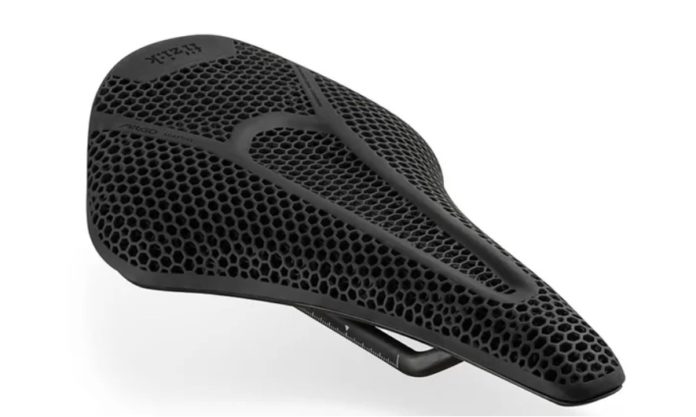Fizik, a company that develops a range of bike saddles, cycling shoes, bike accessories for road cycling, mountain bike and gravel, has completed its portfolio with an Argo Adaptive saddle featuring a 3D printed “digital-padding” upper that aims to improve comfort with its optimisation for varying postures and sit bone positions.
The company had started the development of 3D printed saddles in 2019 but only offered such solution in its Antares model. With the new Fizik Argo Adaptive, the expert adds lattice cushioning to its snub-nosed saddle.
The development of this new 3D printed saddle highlights the company’s technology partnership with 3D printing company Carbon. The latter’s DLS technology has already proven to be a great production candidate for saddles. In this specific case, Fizik’s ‘Concepts’ initiative drove the partnership. The initiative is a cross-disciplinary consortium of leading industry experts and academics that aims to position Fizik at the forefront of cycling innovation.
The advantages of 3D printing in this product development enables the Fizik team to address issues such as power transfer, shock absorption, stability, and comfort according to a cyclist’s personal requirements. That being said, it should be noted that 3D printed cushioning remains a relatively new tech in the world of saddles. However that’s something we can see other brands apart of Specialized and Fizik develop, since short-nose saddles are becoming increasingly popular on road bikes, particularly for those riders who like to maintain an aggressive position and ride ‘on the rivet’ for longer periods.
Indeed, the shape of the saddle and the adaptive cushioning ambition to keep the rider locked in place and avoid unnecessary changes of position. The lattice cushioning can be designed in such a way that it provides more or less cushioning in certain areas to adapt to different riding positions (on the tops vs. drops, for example). Some saddles aim to achieve this with different foam densities, but that then runs the risk of adding pressure at the transition zones, which 3D printing aims to avoid. Also, being a lattice, it results in a lighter saddle too.
“Where a traditional saddle shape encourages riders to shift their position frequently, the new Argo Adaptive puts the rider in a planted position, offering greater stability, comfort and weight distribution,” Fizik says.
The top tier R1 with carbon rails is priced at £299, and will be available in two sizes: 140mm (190g) and 150mm (196g).
Remember, you can post job opportunities in the AM Industry on 3D ADEPT Media free of charge or look for a job via our job board. Make sure to follow us on our social networks and subscribe to our weekly newsletter : Facebook, Twitter, LinkedIn & Instagram ! If you want to be featured in the next issue of our digital magazine or if you hear a story that needs to be heard, make sure to send it to contact@3dadept.com






